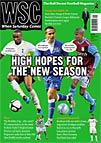 Amid anger and recriminations, has David Beckham's US "project" failed? Neil Forsyth considers an alternative view
Amid anger and recriminations, has David Beckham's US "project" failed? Neil Forsyth considers an alternative view
While most British footballers watched Ayia Napa slide sadly away through aero-plane windows before returning to pre-season training, the most famous of all has had a far more demanding month. David Beckham returned to America and a controversy that could bring a premature end to a relationship that always seemed built on artificiality and misjudgement on the player’s part.
Such has been the coverage of Beckham’s set-to with a section of LA Galaxy fans at half-time of a friendly with AC Milan, it’s worth providing background to what has become the party line – that Beckham returned to furious fans, angry team-mates, and a club that has invested enormously in him only to be betrayed by the stubborn extension of his loan to Milan.
Firstly, the Milan game. Even though the Galaxy are halfway through their season, the 27,000 crowd for the friendly was the highest home attendance yet. There was a mixed response to Beckham’s return – some loud appreciation clashed with booing that was sporadic apart from a more concerted contribution from the LA Riot Squad who occupy a small section of the stadium. It was to them that Beckham walked at half-time and appeared to challenge to join him at pitchside. One fan jumped down and was carted off by security.
The acrimony in the stands has been portrayed as extending to the dressing room through American midfielder Landon Donovan’s disapproving comments about Beckham’s commitment. Donovan moved to Galaxy in 2005 from their historical rivals San Jose Earthquakes in a transfer facilitated by AEG, the same agency that brought Beckham to America. Similarly, when Beckham moved to Milan on loan in January, Donovan moved to Bayern Munich in a matching arrangement and immediately sought a permanent move only for this to be rejected by the German club. While the majority of the Galaxy squad could justifiably feel aggrieved at Beckham’s wilting loyalty to the cause, it’s harder to sympathise with Donovan, the marquee name displaced by Beckham.
The final confusion in the coverage of Beckham’s position at LA Galaxy is financial. He has displayed a definite lack of respect to the MLS, and implicitly the Galaxy, by adversely comparing it to European leagues. However, the suggestion he has betrayed a vast financial investment in him is patently untrue.
This stems from some headline figures given when Beckham announced his move to the MLS in January 2007, with numbers up to $250 million (£152m) being interpreted by the press as his likely reward.
In fact, Beckham’s salary payable by the LA Galaxy is $6.5m a year. This didn’t obliterate the MLS salary cap but was instead an existing loophole that would, for example, allow the 34-year-old Cuauhtemoc Blanco to earn $2.7m playing for the Chicago Fire in 2008. Beckham’s salary is considerably less than he was earning at Real Madrid and, though there is no doubt that external endorsements offer considerable increases, this is how much he is costing the club directly per season. Not this season however, as he and Milan jointly funded a deal for him to miss half the MLS season and that has probably left him playing the second half for free.
LA Galaxy have sold over 350,000 Beckham jerseys, pre-season international tours have featured 80,000 crowds, season ticket sales and commercial activities have expanded beyond recognition. Beckham has had a considerable effect on away gates – when he played against the New York Red Bulls the week before the Milan game, it attracted twice their average home crowd to Giants Stadium – and this is replicated in TV audiences. The point being that, while Beckham’s salary is vast, it is in turn created by his signing. He’s not draining the Galaxy’s resources, he’s adding to them and if he was to leave, his salary would go with him.
In other words, it could have been perfect. The problem was that it happened too early. Beckham was too young, too capable and, crucially, too ambitious to make the move when he did. Fabio Capello made it clear MLS participation in itself would make it hard for Beckham to stretch his England career to the 2010 World Cup. That was a challenge that the player was unable to pass up, hence the forcing of the Milan loan and subsequent extension.
When the MLS season ends in November, it seems likely Beckham will return to Milan until an almost guaranteed trip to South Africa. His increasingly shaky commitment to the LA Galaxy throws up various alternatives afterwards. There could be another “project”, possibly in Asia, but there is a more interesting possibility based on recent comments from Beckham himself – once seemingly impossible, the Premier League may regain its most famous product.
From WSC 271 September 2009